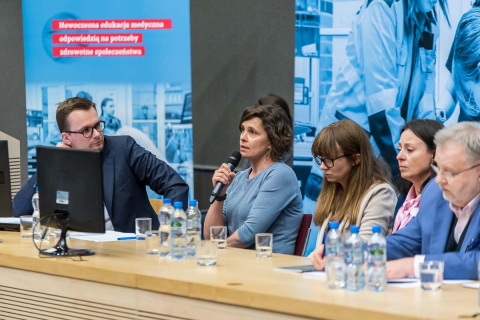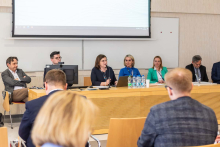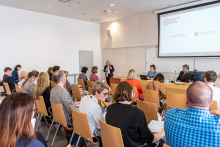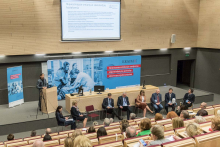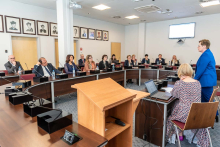The conference was held on April 21. It was attended by more than 300 people. Present were Deputy Ministers Piotr Bromber and Wojciech Murdzek, representing the Ministry of Health and Science. Also present were representatives of the Polish Accreditation Commission, professional self-governments, student and doctoral student communities, as well as academic teachers, deans and vice deans responsible for didactics and quality of education. The conference was hosted by the Medical University of Wroclaw, headed by Rector Prof. Piotr Ponikowski.
Where the problem lies
Currently, the number of students in medical studies is growing. It is therefore necessary to develop standards and good practices to ensure the quality of this education at an appropriate level. To meet the health needs of society today, it is necessary to educate more and at the same time ensure better quality - the question is how to do this. This is what experts pondered during the conference.
The participants discussed within the framework of four panels, concerning the standards of education of future physicians, modern methods of education, cooperation of specialists in various medical fields in the provision of comprehensive services, and communication with patients. Experts also worked in working groups, in which they discussed, among other things, the didactic competence of teachers and the quality of education.
Evaluation and quality monitoring systems
In the work of the "Educational Quality Procedures" group, MUW was represented by Piotr Dziechciarz, MD, PhD, the Rector's Plenipotentiary for Quality of Education. In this team, experts dealt with the review and evaluation of the procedures that make up the systems for assessing and monitoring educational quality. They also took as their goal the answer to the question - how to formulate and implement procedures so that they adequately support the formation of norms and values of members of the academic community.
- The problem is not the bureaucratic development of regulations, codes, procedures, etc. The problem is the creation of a coherent system that would support the building of an academic culture of educational quality while being aware of other non-didactic duties that members of the community of medical universities in Poland must fulfill - said Piotr Dziechciarz, MD, PhD.
Competence of educators
The symposium also included a working group on teaching competencies. It was coordinated by Prof. Marek Kuch, Vice Rector for Student Affairs and Education MUW.
- It is important that medical universities with experience in training medical staff be included in the process of creating new standards for teaching physicians. We hope that the meeting in Wroclaw of representatives of KRAUM and medical universities will be the first in a series of such meetings, and that the recommendations we develop will become a significant element in this process – said Prof. Kuch after the conference.
Dr. Antonina Doroszewska, head of the Department of Medical Communication MUW, also participated in the work. In her opinion, the didactic competencies of teachers are crucial to the training of future medical personnel. They affect many areas, including the quality of education.
- Medical education requires adequate preparation of teachers who teach classes. Thus, the question arises about the preparation of teachers, the required didactic competencies. How can the medical education system support the professional development of teachers? Other issues that need to be discussed are the teaching load and the path of didactic development, as well as the system of motivating teachers to work - said Dr. Doroszewska.
Key recommendations
The organizers of the conference announced that its conclusion will be the KRAUM recommendations on education in the health professions. The preparation of the recommendations was carried out by experts working within the main working group. Among them was Prof. Aneta Nitsch-Osuch, Vice Dean for Curriculum and Educational Quality at the Faculty of Medicine MUW.
- The recommendations indicate that education should be conducted by teaching staff that are constantly developing their competencies. They concern both the area of methodology and the content of education. They indicate the need for students to acquire the ability to communicate with patients, their families and members of the therapeutic team, the ability to solve problems creatively, but also to develop a belief in the need for lifelong learning - Prof. Nitsch-Osuch said. She also stressed that the learning outcomes of medical studies should reflect current developments in medical science, health sciences and pharmaceutical sciences, and should be created in accordance with the principles of evidence-based education. Education should respect the dignity and rights of the patient, should be based on respect, empathy and mutual trust.
- All these elements are necessary to ensure the quality of patient care, as well as the development of our country's health care system - the professor concluded.
